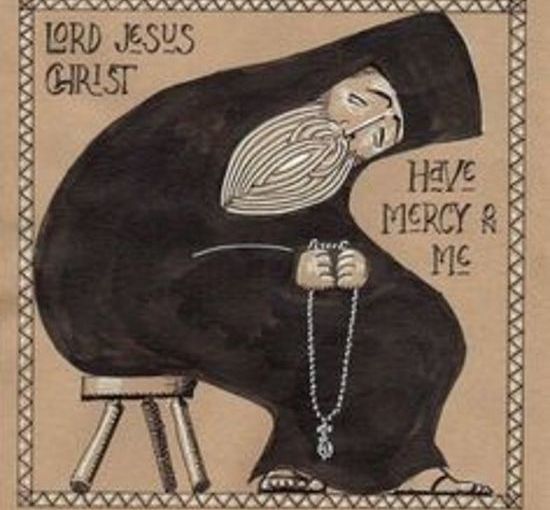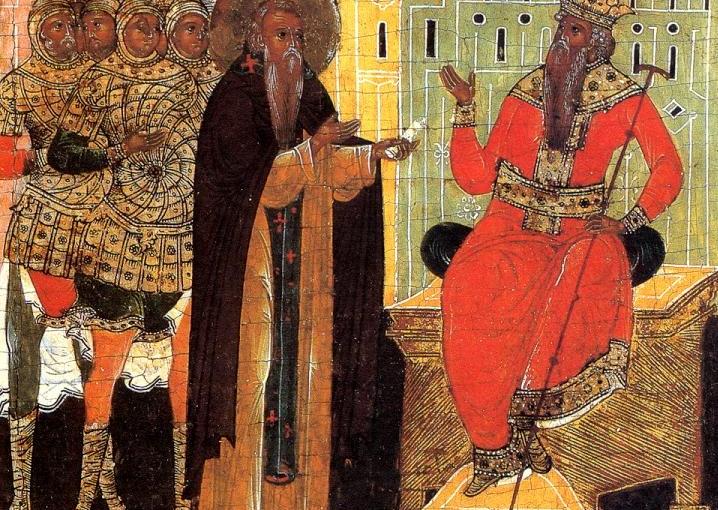In this remarkable section, St. Maximos delves even more deeply into the nature  and experience of our relationship with God.
and experience of our relationship with God.
The key presupposition is that our hearts are empty of the thoughts and images that constantly haunt us, overwhelming with constant mental “noise” and feelings of anxiety that silence God’s voice and prevent inner stillness.
Thoughts and opinions are the loudest “noise creators.”
When our intellect has shaken off its many opinions about created things, then the inner principle of truth appears clearly to it, providing it with a foundation of real knowledge and removing its former preconceptions as though removing scales from the eyes, as happened in the case of St Paul (cf. Acts 9:18).
It occurs to me that, for most of my life, the flood of ideas and opinions that I immediately form in my mind through both propensity and academic training, have blocked me from fully even hearing the other person, let alone experience a moment of mental stillness.
For St. Maximos, the opposite of the restless “academic” intellect or of a mindset caught in incessant and anxious thoughts of fantasy, recrimination or self-pity, is what he calls “the visionary intellect.” This visionary intellect abandons this self-made complexity for true “simplicity.”
It has been “stripped of the complex garment of words with which it is physically draped” and gotten “a glimpse of the simplicity that in some measure discloses this principle.”
And the achievement of simplicity and, through it, the true understanding of the principle is not gained by force but “it reveals itself as though in the sound of a delicate breeze.”
To achieve simplicity, we are asked to rid ourselves from entrenched opinions, rambling thoughts and clever comebacks and become writing tablets instead of pen-wielding authors of our stories.
A pure heart,” St. Maximos explains, “is perhaps one which has no natural propulsion towards anything in any manner whatsoever. When in its extreme simplicity such a heart has become like a writing-tablet beautifully smoothed and polished. God comes to dwell in it and writes there His own laws.
Removing the “scales” and entering into increasingly higher levels of knowledge and unity with God is not a one-time achievement but a lifelong process of ascent. St. Maximos is clear about the difficulty of the upward path yet, at the same time, provides comfort and hope. As long as we stay the course and make progress, however small, we become sojourners on the path of salvation.
So long as the soul advances ‘from strength to strength’ (Ps. 84:7) and ‘from glory to glory’ (2 Cor. 3:18), that is, so long as it advances from one degree of virtue to a greater degree and from one level of spiritual knowledge to a higher level, it remains a ‘sojourner’, one who has no permanent home, as in the saying, ‘My soul has long been a sojourner’ (Ps. 120:6. LXX).
The destination of our journey, the “miraculous tabernacle’
…a dispassionate and untroubled state of virtue in which the Logos of God adorns the soul like a tabernacle with the varied beauties of the virtues. ‘The house of God’ is spiritual knowledge compounded of many different forms of contemplation when God dwells in a soul, filling it from the bowl of wisdom. ‘Exultation’ is the soul’s leap of joy at the riches of the virtues. ‘Thanksgiving’ is gratitude for the bountiful outpouring of wisdom. ‘The sound of feasting’ is the unceasing mystical hymn of glory, which exultation and thanksgiving combine to form.
St. Maximos makes another important point about the journey to stillness and union with God. Even though it entails stripping ourselves of worldly pleasures and passions and acquiring Christ’s intellect, “this does not come to us through the loss of our own intellectual power; nor does it come to us as a supplementary part added to our intellect; nor does it pass essentially and hypostatically into our intellect.”
On the contrary, “it illumines the power of our intellect.”
“In my opinion,” St. Maximos continues, “the person who has Christ’s intellect is he whose intellection accords with that of Christ and who apprehends Christ through all things.”
Similarly, even though we are the body of Christ, “we do not become this body through the loss of our own bodies; nor again because Christ’s body passes into us hypostatically or is divided into members; but rather because we conform to the likeness of the Lord’s flesh by shaking off the corruption of sin.”
In the lifelong journey to simplicity and stillness, we shed passions and clothe ourselves in Christ while never losing our personhood. We excise opinions and thoughts, not to become incapable of thinking for ourselves, but to remove the scales that distort our view of the truth and drown the voice of God.
 aspects and manifestations of our journey to God, from purification to illumination and theosis, for example, the three levels of one’s experience of the Sabbath; the passage from Chaldea to Mesopotamia and, finally, the holy land; the symbolic meanings of Saul, David and Samuel.
aspects and manifestations of our journey to God, from purification to illumination and theosis, for example, the three levels of one’s experience of the Sabbath; the passage from Chaldea to Mesopotamia and, finally, the holy land; the symbolic meanings of Saul, David and Samuel.

 he stopped at Haran, which was the midway point. In this section, St. Maximos refers to Haran as the symbolic midway point in our spiritual journey, “the intermediate state between virtue and vice – a state not yet purified from the delusion of the senses.”
he stopped at Haran, which was the midway point. In this section, St. Maximos refers to Haran as the symbolic midway point in our spiritual journey, “the intermediate state between virtue and vice – a state not yet purified from the delusion of the senses.” After the first few lines of this treatise, your head might start spinning. No wonder we spent over an hour on just a few paragraphs (#1-11) during our discussion last Friday.
After the first few lines of this treatise, your head might start spinning. No wonder we spent over an hour on just a few paragraphs (#1-11) during our discussion last Friday.

